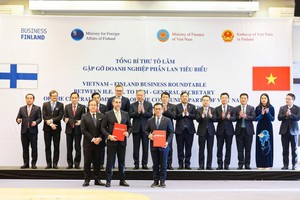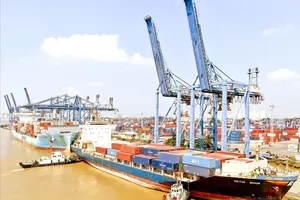
They also argued that a genuinely level playing field is the only way that the Vietnamese private sector, mostly comprising small and medium-sized enterprises, can pull its real economic weight.
At the 2017 Vietnam Business Development Forum (VBDF) held in Hanoi, they said the private sector was becoming more crucial for attaining national economic growth targets, but it could only progress further with right incentives and support from the Government.
Ho Sy Hung, deputy head of the Department of Enterprise Development under the Ministry of Planning and Investment (MPI), said that the private sector in Vietnam consists mostly of micro, small and medium-sized enterprises.
These firms account for 97.7 percent of the total labour and 94.8 percent of total capital in the private sector, he said.
As such, the majority of private companies fail to generate enough return on sales (ROS), since they lack the capital to upgrade facilities and improve productivity.
As of 2016, the ROS for these small businesses was around 1.72 percent, compared to the public sector’s 6.04 percent and the foreign direct investment (FDI) sector’s 6.95 percent.
Hung urged policy makers to take these low numbers into consideration and issue suitable policies for the private sector, instead of just accommodating the State and FDI sectors.
He said he firmly believed in the potential of the private sector, which contributed 43.22 percent of the GDP in 2016, while the State sector accounted for 28.69 percent.
In the first five months of 2017, more than 50,000 new private businesses have been established and an additional VND1.2 billion (US$53,492) has been put into circulation, said.
Vu Dinh Anh, deputy director of the Price and Market Research Institute under the Ministry of Finance, agreed with Hung, saying that the private sector must be given the same treatment as the State and foreign-owned sector if it is to drive Vietnam’s economic progress.
However, he said, small and very small enterprises are also undermining themselves by not taking the initiative to follow relevant regulations even as they demanded preferential treatment.
Ánh noted that policy makers cannot give further priority to these firms in terms of rentals and loan rates.
He said the current interest rates for small and very small businesses of 7 to 9 percent per annum were already normal, and the only help the Government can provide is to make loans more accessible.
Regardless, the current set of Vietnamese business regulations sometimes prevent small enterprises from growing, said Dau Anh Tuan, director general of the Legal Department of the Việt Nam Chamber of Commerce and Industry (VCCI).
He also said that he’d observed a trend in which the larger a business is, the more likely it is subjected to several inspections by different agencies.
Such approaches do not provide businesses incentives to grow, he said, adding a study found 14 percent of businesses reporting “duplicated” inspections in 2016, while 65 percent said they’d had trouble dealing with administrative procedures.
Hung from the MPI recommended that the Government lifts the burden on the private sector by helping reduce production costs in terms of logistics, insurance and transportation, and by simplifying administrative procedures.
The forum was jointly organised by the MPI and the Economy and Forecast Review Journal.
More than 300 representatives of various ministries and economic sectors attended the forum.
























